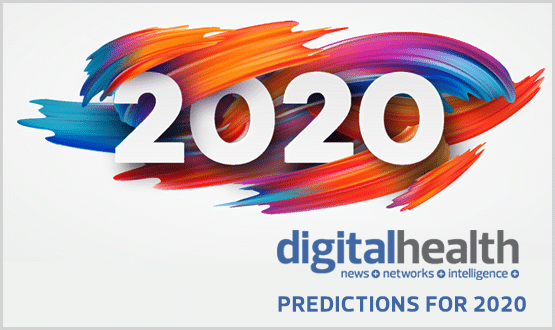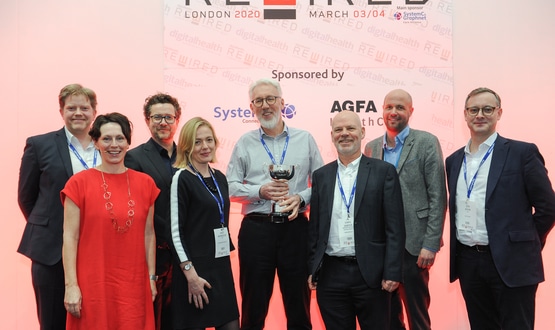2020 predictions: Health tech suppliers on what’s in store
- 2 January 2020

After a busy 2019, we asked some health tech suppliers to give their predictions for the year ahead. Here is what they had to say.
Markus Bolton, joint CEO, System C
“2020 is going to be all about integrated care systems. The main drive for IT will be in support of ICSs – joining up records and workflows across care economies, integrating health and social care, and using population health to provide the insights required to underpin the transformation of services.
“At the same time, the provider digitisation programme will gather pace as more trusts deploy clinical systems. On the standards front, the emphasis is going to move from HIMSS to standards which include mobile support and patient flow, supporting the delivery of systems that manage patients and support clinicians efficiently.”
Mike Fuller, regional director of marketing at InterSystems
“Despite uncertainties caused by the election and promised funding not yet coming through for global digital exemplars or local health and care record exemplars, we should expect see a more muscular approach to standards enforcement from NHS Digital as it appoints both a head of standards and a chief commercial officer.
“Even if funding does get back on track, there seems little appetite or ability to take on a large-scale electronic patient record projects outside the largest acute trusts.
“A ‘best of breed’ or more like ‘best of suite’ approach may be better for the market that needs systems that can phased-in and implemented over a longer period of time.”
Matthew Stickland, senior healthcare analyst at TPP
“Before looking ahead, I think it is worth looking back at 2019 as it has been quite an eventful year for digital health within the NHS. The establishment of NHSX has been a positive move and we like the direction in which it is headed. The breakthroughs on interoperability this year have also been fantastic to see.
“We now have structured data being passed between suppliers – using national standards – and this is a really important step. The exemplar projects for the GPConnect and the Generic FHIR receive programmes are already improving continuity of care and helping staff to work more efficiently.
“Looking into next year, it’s vital that we all keep up the interoperability momentum. We need to keep focussed on national specifications and infrastructure, driven by solid use cases that are going to provide clinical benefit quickly. For example, interoperability is going to be crucial for the Primary Care Networks.
“Away from interoperability, it seems likely that smartphone apps will continue to take a more core position in digital health. Opening up the NHS Login service presents a real opportunity for suppliers to shake up the patient-facing market. I also think that it’s a make-or-break year for AI in healthcare. There’s been a lot of talk of the potential of how this technology can facilitate patient care but we’ve now got to see this implemented and evaluated in the real-world. The acute sector looks set to accelerate with digitisation over the next year too. It will be interesting to see how the new HSSF framework impacts the way in which healthcare technology is commissioned here.’
Paul Jackson, head of marketing, Europe north at Agfa
“Throughout 2019, the buzz and discussion around AI, and how it can help the NHS has continued. 2020 will see Agfa HealthCare putting its augmented intelligence plans into practice. Selected UK sites will start using Agfa’s Enterprise Imaging platform, with embedded, real-time AI algorithms. This will support radiology departments and radiologists to be even better, faster and more efficient.
“2020 will also see Agfa’s Enterprise Imaging sites expand the imaging EMR platform outside radiology to maximise the benefits even further. Imaging from departments such as ophthalmology, cardiology, dermatology and theatre imaging will be available on one single consolidated platform presented within electronic health record, so patient records can also include all related images.”
Cleveland Henry, director of cloud at UKCloud Health
“My prediction with be of no surprise, I see an accelerated adoption of cloud. 2019 was a year of continued early adoption of cloud at scale but more so an acceptance and understanding that cloud computing is more than ‘just someone else’s computer’, but enabling tech that can equally support legacy to digital transformation as well as a key component of new digital services.
I see this adoption in three areas; data centre modernisation (moving out of aging data centres and computer rooms – stop buying tin, de-risking the technology environment (DR, Backup, Security compliance, increased resilience) and big-data analytics (moving away from unconnected data silo’s).
Outside of cloud, I predict we will see even more patient engagement through tech enabling information on ‘where am I on the pathway’, ‘what happens next, and ‘what can I do myself’ across all care settings.
All of our contributors and other leading health technology figures, will be at Digital Health Rewired on March 3-4.
The event, taking place at London Olympia, is a two-day conference and one-day exhibition which connects health IT leaders and professionals with the latest disruptive digital health innovations.
Make sure you have booked your place today.





